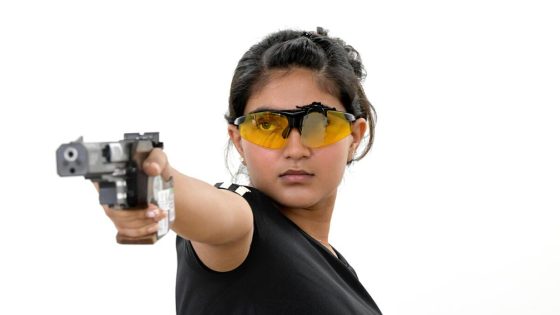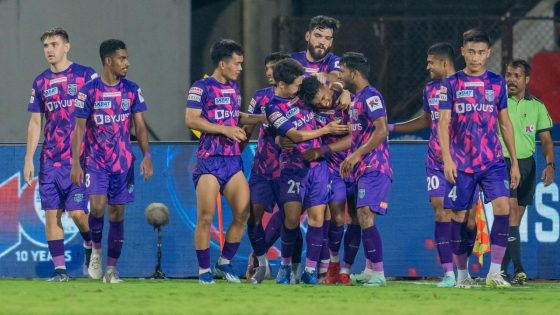Shooters might be sticklers for familiarity, but ahead of the final of the women’s 25m pistol competition in the fourth Olympic selection trials, Esha Singh swapped the Pardini pistol, with which she had shot three trials and the qualification round of the fourth, for her spare.
Although the device was the exact same brand and weight as the one she always shoots with and expert moulders can get the contour of the handle nearly identical to her stock weapon as well, all shooters know that the feel of a spare will never match that of the original.
ALSO READ | Manu dominates women’s 25m sports pistol final, Vijayveer triumphs in rapid fire
“You never know what might happen in a major competition. Both my pistols are very similar, but I just wanted to see what’s going on with my spare as well. Because in case I have an opportunity where I have to use it, then I need to know what’s going on,” she said.
Events in the final showed just why Esha’s thinking might not be so misplaced. Simranpreet Brar, one of the competitors in the final, wound up with an equipment malfunction during her fifth series of shots.
Brar wasn’t carrying a spare pistol and only just managed to have an issue with her gun – a problem with a trigger mechanism – rectified in time to continue her competition.
While Esha didn’t get the finish she wanted – she wound up taking fourth place in the final – she has no complaints about her decision to step outside her comfort zone.
“I’ve always been someone who doesn’t have a problem competing under pressure,” she says.
And if she got to put herself in that position on Tuesday, she earned the right a day earlier. While Manu Bhaker was the outright leader after three rounds of the Olympic selection trials, Esha was in a less certain position against Rhythm Sangwan, who had already won the Olympic quota for India.
The team was going to be selected on the basis of average score of the three best totals out of the four selection trials and despite two poor scores in Delhi, Rhythm had made up for it with a strong 586 in the third selection trials in Bhopal.
After the conclusion of three selection trials, Esha needed to shoot better than the 579 she shot in her second selection trials as well as hope Rhythm didn’t shoot more than six points better than her.
Despite a rocky start in which she dropped two of her first five shots, Esha did just that. She scored 586 – her best qualification score in the four selection trials – while Rhythm scored 584. It was that result that made Esha’s selection to the Olympic team a mathematical certainty, even ahead of the final. Following the final, Esha ended the trials with an average rating of 584.07, edging out Rhythm’s 582.20.
ALSO READ | With Olympic rings ‘in his heart’, shooter Vijayveer looks to make India proud at Paris 2024 Games
It’s become a routine for Esha to perform when the pressure on her has been intense. At last year’s Asian Games, Esha, who at 18 years old was the youngest member of the squad, won four medals – the most in the Indian shooting team at Hangzhou.
She routinely upstaged bigger names too, going back to the time when, all of 13 years old, she won the 10m pistol event at the 2018 National Championships, beating the likes of Bhaker and Rio Olympian Heena Sidhu.
Despite those prodigious wins, Esha says it’s the fact that she’s not always had it easy that’s helped her the most.
“If you actually see my journey, I’ve never had a straight line in terms of my progression. There have been so many highs and lows that it doesn’t really affect me. The lows especially have made me who I am today because I know exactly what goes wrong. I know how to handle it because I have been through it before. So, it’s not something new for me. If I have a bad start or a bad finish to a qualification round then I know how to deal with it,” she says.
That’s why she says she’s grateful for having come through the selection trials where she was at a two-point disadvantage as a non-quota winner.
“I think these were some of the hardest matches I’ve ever had to play. There was so much at stake because the Olympics were on the line which will be the highest level to which I’ve ever come to in my career. It’s a new experience for me and it was hard but that’s what has helped me grow as a person. I got to see what my limits were as a player. More than the fact that I got a high score when I needed it, I liked how I was able to fight as hard as I did,” she says.
Having sealed a place in the Olympics in the 25m pistol event, Esha has a chance to compete in multiple events in Paris. In a couple of days’ time she will be taking part in the third and fourth trials of the women’s 10m air pistol category.
Even though Esha will benefit from getting a two-point advantage for having won the Olympic quota at the Asian Championships earlier this year, she says she will not want to compete under any less pressure.
“The 25m pistol is an event where there is a lot of risk involved but that doesn’t mean you can relax more in the 10m air pistol event. I’ve still not in a certain position to qualify. I’ll have to be at my best,” she says.
Source Agencies



